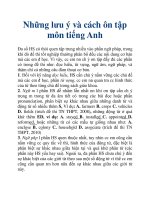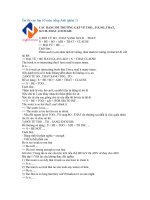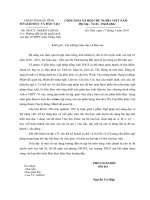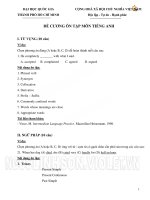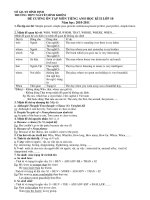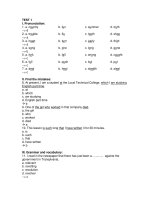chuyên đề ôn tập môn tiếng anh
Bạn đang xem bản rút gọn của tài liệu. Xem và tải ngay bản đầy đủ của tài liệu tại đây (355.12 KB, 18 trang )
<span class='text_page_counter'>(1)</span><div class='page_container' data-page=1>
<b>ÔN TẬP LỚP 10</b>
<b>UNIT 3. MUSIC</b>
<b>I. VOCABULARY</b>
1. air /eə(r)/ (v): phát thanh/ hình
2. audience /ˈɔːdiəns/ (n): khán/ thính giả
3. biography /baɪˈɒɡrəfi/ (n): tiểu sử
4. celebrity panel /səˈlebrəti - ˈpænl/ (np): ban giám khảo gồm những người nổi tiếng
5. clip /klɪp/ (n): một đoạn phim/ nhạc
6. composer /kəmˈpəʊzə(r)/ (n): nhà soạn nhạc
7. contest /ˈkɒntest/ (n): cuộc thi
8. dangdut (n): một loại nhạc dân gian của In-đô-nê-xi-a
9. debut album /ˈdeɪbjuː - ˈælbəm/(np): tập nhạc tuyển đầu tay
10. fan /fæn/ (n): người hâm mộ
11. global smash hit /ˈɡləʊbl - smæʃ - hɪt/(np): thành công lớn trên thê giới
12. idol /ˈaɪdl/ (n): thần tượng
13. judge /dʒʌdʒ/ (n): ban giám khảo
<b>14. passionate /ˈpỉʃənət/ sơi nổi, say sưa</b>
15. phenomenon /fəˈnɒmɪnən/(n): hiện tượng
16. platinum /ˈplætɪnəm/(n): danh hiệu thu âm dành cho ca sĩ hoặc nhóm nhạc có tuyển tập nhạc
phát hành tối thiểu 1 triệu bản
17. post /pəʊst/ (v): đưa lên Internet
18. process /ˈprəʊses/ (n): quy trình
19. release /rɪˈliːs/ (v): cơng bố
<b>II. GRAMMAR: compound sentences and infinitives</b>
<b>1. Compound sentences (Câu ghép)</b>
<b>FORM : Có 2 mệnh đề chính, nối nhau bằng liên từ (như and, but, so, or...) và phải có dấu phẩy </b>
hoặc dấu chấm phẩy phía trước liên từ.
Ex: His father is a doctor, and his mother is a writer.
We missed the bus, so we came to work late.
The concert was exciting at the beginning, but it became boring at the end.
<b> At the box office, you can buy the tickets for the show, or you can purchase them online.</b>
<b>Notes: </b>
</div>
<span class='text_page_counter'>(2)</span><div class='page_container' data-page=2>
Ex: I talked and he listened.
<i>- Trong tiếng Việt bạn có thể dùng dấu phẩy giữa hai mệnh đề chính nhưng trong tiếng Anh tuyệt </i>
<i>đối không được mà phải sử dụng liên từ.</i>
<b>2. Infinitives (Hình thức nguyên thể)</b>
<i>Hình thức nguyên thể là hình thức cơ bản của động từ. Hình thức ngun thể có thể có to ( </i>
<i>to-infìnitive) hoặc khơng có “to” (bare iníĩnitive).</i>
<i><b>Cách dùng</b></i>
<b>a) bare infinitive (ngun mẫu không “to”) </b>
<i>Ta thường dùng động từ nguyên mẫu không “to” (bare infinitive) trong các trường hợp sau:</i>
<b>Sau các trợ động từ khiếm khuyết: can, could, may, might, must, need, shall, should, will,</b>
and would.
Ex: I can speak Japanese.
<b>Sau các ngữ động từ như: had better, would rather, would sooner,...</b>
Ex: You had better tell him the truth.
<b>Sau “let/make/have/help + tân ngữ”</b>
Ex:The news made him look anxious.
<b>Sau “động từ chi tri giác + tân ngữ” như: see, hear, feel, watch,...</b>
Ex: I saw her get off the bus.
<b>b) To infinitive (động từ nguyên mẫu có “to”) </b>
Động từ nguyên mẫu có “to” (to infinitive) được dùng trong các trường hợp sau:
<b>Đứng sau một số động từ :</b>
Agree Arrange Ask Attempt Begin
Care Wish Choose Claim Come
Continue Decide Want Demand Try
</div>
<span class='text_page_counter'>(3)</span><div class='page_container' data-page=3>
Threaten Help Tend Hope Intend
Learn Like Used to Seem Manage
Mean Need Refuse Offer Omit
Plan Propose Pretend Prepare Promise
<b>Ex:We decided to wait for the bus.</b>
<b>Câu có ý chỉ mục đích, kết quả:</b>
Ex: I saved money to buy a bicycle.
<b>Sau the first, the second, the last, the only hoặc sau hình thức so sánh cực cấp dfl thay </b>
<b>cho mệnh đề quan hệ.</b>
Ex: They are the first to leave all their money to charity.
<b>Dùng trong cấu trúc too/ enough</b>
Ex: He is too short to become a pilot.
<b>III. EXERCISES </b>
<i><b>Exercise 1. Choose the best answer A, B, C or D to complete the sentences:</b></i>
1. He is a______pianist. He has won the gold medal in an international contest.
A. talent B. talented C. terrible D. bad
2. Joe is very_________about music.
A. popular B. famous C. passionate D. interested
3. He looks like a different person__________stage.
A. above B. to C. with D. on
4. The life story of a person written by someone else is called________.
A. biology B. biography C. talent D. superstar
5. The band's latest album will be________next week.
A. become B. won C. written D. released
6. Beethoven, Schumann and Chopin were leading Romantic _______.
A. singer B. actors C. composers D. audience
7. The________clapped and cheered when she began to sing.
A. performance B. phenomenon C. audience D. melody
8. Quan Ho singing___________in Bac Ninh Province.
A. recognised B. reversed C. originated D. consisted
9. Guitars, flutes, organs, drums are called musical_____________.
</div>
<span class='text_page_counter'>(4)</span><div class='page_container' data-page=4>
10. Taylor Swift is_________as the most successful country music composer and singer of modern
time.
A. replied B. received C. originated D. recognised
11. Tien Quan Ca is the national___________ of the Socialist Republic of Vietnam.
A. composer B. singer C. anthem D. instrument
12. The judge__________appreciated her performance but the audience didn’t like it very much.
A. channel B. canal C. concert D. panel
13. Almost everyone in the world listens to his music. He is a_________star.
A. local B. national C. global D. city
14. This composer always look happy,________his songs sound sad.
A. but B. because C. so D. therefore
15. Dangdut is a kind of__________music.
A. Vietnamese B. American C. Indonesian D. Indian
16. She is talented enough_________bright like a star.
A. shining B. to shine C. shine D. to shining
17. They force me_______his address.
A. telling B. to tell C. tell D. told
18. You should______more if you want to become a professional pianist.
A. practise B. to practise C. practising D. practised
19 The football match was wonderful at the beginning, __________ it was awful at the end.
A. but B. and C. or D. so
20. These days, things have become more convenient, for example, you can buy airline tickets at
air agencies, __________you can purchase the online.
A. yet B. for C. so D. or
<i><b>Exercise 2. Give the correct form of the verbs in brackets:</b></i>
<b>1. They let us ( use ) __________ this room for our study</b>
<b>2. I decided ( do ) __________ a hotel management course in 2012</b>
<b>3. Their clients agree ( pay ) __________ by check</b>
<b>4. Recently, her husband has made her ( stay ) __________ at home.</b>
<b>5. The course help me ( understand ) __________ my cat better.</b>
<b>6. Their family didn’t want ( move ) __________Scotland last year.</b>
</div>
<span class='text_page_counter'>(5)</span><div class='page_container' data-page=5>
<b>9. Have you ever hoped ( see ) __________our idol in real life.</b>
<b>10. It was too cold (go) __________ out yesterday.</b>
<b>11. I was proud (be) __________ the leader of the group.</b>
<b>12. She saw a her boyfriend (ride) __________ with a girl on an expensive motorcycle.</b>
<i><b>Exercise 3. Give the correct form of the words in brackets:</b></i>
<b>1. He looks ______________ on stage ( passion )</b>
2. This is one of the most ______________ entertainment formats in the UK. It attracts a
<b>significantly huge number of audience ( success ) </b>
<b>3. The ______________ have to get over that challange to win in this contest. ( contest )</b>
<b>4. Is Vietnam Idol an ______________ program or a franchised one ? ( origin )</b>
5. Van Cao is known as one of the most important ______________ of modern Vietnamese music
<b>( compose )</b>
<b>6. After his______________ ,he recieved the Ho Chi Minh prize ( die )</b>
</div>
<span class='text_page_counter'>(6)</span><div class='page_container' data-page=6>
<b>UNIT 4. FOR A BETTER COMMUNITY</b>
<b>I. VOCABULARY</b>
<b>A. Vocabulary </b>
1. advertisement /ədˈvɜːtɪsmənt/ (n): quảng cáo, rao vặt
2. announcement /əˈnaʊnsmənt/ (n): thông báo
3. apply for /əˈplaɪ/(v): nộp đơn xin việc
4. aware of / əˈwer/ (a): ý thức
5. by chance /baɪ - tʃɑːns/ (np): tình cờ, ngẫu nhiên
6. community /kəˈmjuːnəti/(n): cộng đồng
7. concerned /kənˈsɜːnd/ (a): lo lắng, quan tâm
8. creative /kriˈeɪtɪv/ (a): sáng tạo
9. dedicated /ˈdedɪkeɪtɪd/ (a): = devoted tận tâm, tận tụy
10. development /dɪˈveləpmənt/ (n): sự phát triển
11. disadvantaged /ˌdɪsədˈvɑːntɪdʒd/(a): thiệt thòi
12. donate /dəʊˈneɪt/ (v): cho, tặng
=> donation (n)
13. employment /ɪmˈplɔɪmənt/ (n): việc tuyển dụng
14. facility /fəˈsɪləti/ (n): cơ sở vật chất, trang thiết bị
15. fortunate /ˈfɔːtʃənət/ (a): may mắn
16. handicapped /ˈhændikæpt/ (a): tàn tật, khuyết tật
17. ignorant /ˈɪɡnərənt/ (a): ngu dốt, thất học
18. interact with/ˌɪntərˈækt/ (v): tương tác
19. invalid /ɪnˈvælɪd/ (n): người tàn tật, người khuyết tật
20. leader /ˈliːdə(r)/ (n): người đứng đầu, nhà lãnh đạo
21. martyr /ˈmɑːtə(r)/ (n): liệt sỹ
22. meaningful /ˈmiːnɪŋfl/ (a): có ý nghĩa
23. narrow-minded /ˌnỉrəʊ ˈmaɪndɪd/(a): nơng cạn, hẹp hòi
24. non-profit /ˌnɒn ˈprɒfɪt/ (a): phi lợi nhuận
</div>
<span class='text_page_counter'>(7)</span><div class='page_container' data-page=7>
29. post /pəʊst/ (n): vị trí, địa vị, chức vụ
30. priority /praɪˈɒrəti/(n): việc ưu tiên hàng đầu
31. public /ˈpʌblɪk/ (a): công cộng
32. remote /rɪˈməʊt/ (a): xa xôi, hẻo lánh
33. volunteer / /ˌvɒlənˈtɪə(r)/ (n)(v) tình nguyện
<b>B. Adjective suffixes: -ed vs. –ing, -ful vs. -less</b>
<b>1. Tính từ kết thúc bằng -ed và -ing</b>
<b>+ Tính từ kết thúc bằng đi -ed diễn tả ai đó cảm thấy thế nào.</b>
Ex: My sister is annoyed with the new cat.
<i>Chị gái tớ cảm thấy khó chịu vì con mèo mới.</i>
<b>+ Tính từ kết thúc bằng -ing diễn tả bản chất, tính chất của người, sự vật hay sự việc.</b>
Ex: The new cat is very annoying.(I am annoyed by the new cat.)
<i>Con mèo mới thật là phiền phức. (Tơi cảm thấy phiền phức vì con mèo mới đó.)</i>
Ex: That girl is boring.
<i>Cơ gái đó thật nhàm chán.</i>
<b>2. Tính từ kết thúc bằng -ful và -less</b>
<b>+ Tính từ kết thúc bằng -ful thường mang nghĩa tích cực hơn là tính từ kết thúc bằng -less.</b>
Các tính từ này thường có gốc là một số danh từ và thường mang nghĩa ngược nhau.
Ex: <i>careful (cẩn thận) - careless (bất cẩn)</i>
<i>hopeful (lạc quan, đầy hi vọng) - hopeless (vơ vọng)</i>
<i>helpful (hữu ích, nhiệt tình) - helpless (bất lực)</i>
<i><b>II. GRAMMAR: The past simple vs. the past continuous with When and While</b></i>
<b>Dạng thức Thì quá khứ đơn và thì quá khứ tiếp diễn </b>
<b> THÌ QUÁ KHỨ ĐƠN </b> <b>THÌ QUÁ KHỨ TIẾP DIỄN </b>
<b>1. To be: </b>
<i>S+Was/Were + Adj/ Noun</i>
Ex: She was a charming actress
They were renowned scientists
<b> 2. Verbs:</b>
S+V (-ed/c2)
Ex: They invented the light bulb on their
own
<i>S+Was/Were+V-ing</i>
Ex:
- I was playing sports when my mom came
home
</div>
<span class='text_page_counter'>(8)</span><div class='page_container' data-page=8>
<b>Chức năng Thì q khứ đơn và thì q khứ tiếp diễn</b>
<b>THÌ QUÁ KHỨ ĐƠN </b> <b>THÌ QUÁ KHỨ TIẾP DIỄN</b>
1. Diễn đạt một hành động xảy ra và
chấm dứt hoàn toàn trong quá khứ
Ex: Dickens wrote Oliver Twist
2. Diễn đạt các hành động xảy ra liên
tiếp trong quá khứ
Ex: She came home, switched on the
computer and checked her e-mails.
3. Được sử dụng trong một số công
thức sau:
- I used to ridebicycle to school (thói
quen trong quá khứ)
- I was eating dinner when she came
-If I were you,I wouldn't get engaged to
him (Câu điều kiện loại II)
4. Signal Words:
Last night/ year/month; yesterday, 2
years ago; in 1999...
1. Diễn đạt một hành động đang xảy ra tại một thời
điểm trong quá khứ
Ex: What were you doing at 8:30 last night?
2. Diễn đạt hai hành động xảy ra song song nhau
trong quá khứ
Ex: While my dad was reading a magazine, my mum
was cooking dinner
3. Được sử dụng trong một số cấu trúc sau
- I saw Henrywhilehe was walkingin the park
- I was listening to the newswhen she phoned (một
hành động đang xảy ra thì hành động khác chen
ngang)
4. Signal Words:
At this time last night; at this moment last year; at 8
p.m last night; while...
<b>Trong mệnh đề chứa when/ while </b>
<i>Hành động đang diễn ra trong quá khứ thì một hành động khác xảy đến và thường được nối</i>
<i>với nhau bằng liên từ when, while (dùng past progressive cho hành động xảy ra trong một </i>
<i>thời gian dài và thì past simple cho hành động xảy ra trong thời gian ngắn).</i>
Ex: I was washing my hair when the phone rang yesterday.
While I was working in the garden, I hurt my back.
<i>Hai hay nhiều hành động xảy ra song song trong quá khứ và thường được nối với nhau </i>
<i>bằng liên từ while.</i>
Ex: My father was watching television while my mother was cooking dinner.
Yesterday, I was watching TV while my mother was washing the clothes.
<i><b>Lưu ý:</b></i>
<i>- Khi có hai sự kiện xảy ra trong quá khứ, sự kiện nào xảy ra dài hơn ta dùng quá khi tiếp diễn, </i>
<i>sự kiện nào xảy ra ngắn hơn ta dùng quá khứ đơn và trong những tình huống như vậy thường có </i>
<i>liên từ when để nối hai câu.</i>
</div>
<span class='text_page_counter'>(9)</span><div class='page_container' data-page=9>
<b>III. EXERCISES </b>
<i><b>Exercise 1. Choose the best answers A, B, C or D to complete the sentences :</b></i>
1. The children seem to be ... of working quietly by themselves.
A. ready B. incapable C. competent D. able
2. It ... the whole evening, but Ann still went out for a run.
A. was raining B. would rain C. has rained D. rains
3. While he ... the car, he ... a big case in the boot
A. is washing / discovered B. was washing / discovered
C. washed/ discovered D. washed / was discovering
4. One major ... of this area is lack of public transport.
A. advantage B. disadvantaged C. disadvantage D. advantaged
5. The company ... to donate fifty trucks to help the flooded area.
A. volunteered B. sponsored C. forced D. told
6. When I got to the hospital, she ... in the waiting room.
A. sat B. has been sitting C. was sitting D. had sat
7. They’ve done an ... job in making sure that all the supplies got through.
A. admirable B. admiring C. admirous D. admireful
8. Jane doesn’t enjoy her job. She’s bored ... doing the same things every day
A. about B. of C. at D. in
9. Luckily, I got some ... advice on how to make a presentation on ‘For a better community’
from my class teacher.
A. useless B. useful C. usefulness D. uselessness
10. These ...children encounter many problems and really need our help.
A. disadvantaged B. advantaged C. disadvantage D. advantage
11. Fundraising for charity is a ... thing for everyone to do to help the community.
A. meant B. meaningful C. meaningless D. meaning
12. They were so ... about joining the local volunteer group that they couldn’t sleep last
night.
A. excite B. excitement C. exciting D. excited
13. It is ... that all the students in class 1OA choose to do a project on ‘Helping the needy’.
A. surprising B. surprised C. surprise D. surprisingly
14. Volunteers become well ... of the problems facing the world.
A. aware B. concerned C. helpful D. interested
15. Most of the students in that special school are making good progress, but Michael is a
...case.
</div>
<span class='text_page_counter'>(10)</span><div class='page_container' data-page=10>
16. Volunteers can work with many ... children who were harmed by Agent Orange in
childcare centres.
A. parentless B. disabled C. poor D. homeless
<i><b>Exercise 2. Put the verbs in brackets in the past simple or the past continuous tense.</b></i>
1/ He (sit) ………. in a bar when I (see) ………. him.
2/ When I (go) ………. out, the sun (shine……….
3/ The light (go) ………. out while I (have………. tea.
4/ While she (speak) ………. on the phone, someone (break) ………. into her
house.
5/ We (walk) ………. to the station when it (begin) ………. to rain.
6/ How fast ( you / drive ) ………. when the accident happened ?
7/ They (talk) ………. about me when I (come) ………. in.
8/ He (eat) ………. three sandwiches while you (talk) ………. to him.
9/ The servant (drop) ………. two cups while she (wash up) ………. last night.
<i><b>Exercise 3. Complete the sentences, using the adjectives ending –ed, -ing, -ful, or less</b></i>
<b>1. You look really ……….. Why don't you go to bed? (TIRE)</b>
<b>2. He is a really ………. driver. One day he's going to have an accident. (CARE)</b>
<b>3. It's ……….. England will never win the World Cup football again. (HOPE)</b>
<b>4. Sit down - I've got some very ……….news for you. (EXCITE)</b>
<b>5. My best friend is a rich, ………..lawyer. (POWER)</b>
<b>6. He's got a very ………. habit of always interrupting people. (ANNOY)</b>
<b>7. I'm very ……….. by your behaviour. (DISAPPOINT)</b>
<b>8. You must remember to recharge your phone. Without its batteries, it's ……….. (USE)</b>
<b>9. Cigarettes are ………..to your health. (HARM)</b>
<b>10. I am going to give some clothes to the ……… . (HOME)</b>
<i><b>Exercise 4. Finish each of the following sentences in such a way that it means the same as the</b></i>
<i><b>sentence printed before it.</b></i>
1 The piano is very heavy. Nobody can lift it.
The piano is too ..……….
2 I met her during my stay in Paris last summer.
While I ……….……….
3 Jimmy got into his car and drove away. I saw this.
I saw him……… ………
4. I was bored with that film.
</div>
<span class='text_page_counter'>(11)</span><div class='page_container' data-page=11></div>
<span class='text_page_counter'>(12)</span><div class='page_container' data-page=12>
<b>UNIT 5. INVENTIONS</b>
<b>I. VOCABULARY</b>
1. bulky /ˈbʌlki/ (a): to lớn, kềnh càng
2. cling /klɪŋ/ (v) bám, dính
3. collapse /kəˈlỉps/ (v): xếp lại, cụp lại
4. earbuds /ˈɪəbʌdz/(n): tai nghe
5. economical /ˌiːkəˈnɒmɪkl/ (a): tiết kiệm
6. fabric /ˈfæbrɪk/ (n): vải, chất liệu vải
7. generous /ˈdʒenərəs/ (a): rộng rãi, hào phóng
8. hook and loop fastener = velcro/ˈvelkrəʊ/ (n) khóa dán
9. headphones /ˈhedfəʊnz/ (n): tai nghe qua đầu
10. imitate /ˈɪmɪteɪt/ (v): bắt chước, mô phỏng theo
11. inspiration /ˌɪnspəˈreɪʃn/ (n): nguồn cảm hứng
12. invention /ɪnˈvenʃn/ (n): sự phát minh, vật phát minh
13. observe /əbˈzɜːrv/ (v) quan sát
14. patent /ˈpætnt/ (n,v): bằng sáng chế; được cấp bằng sáng chế
15. portable (a): dễ dàng mang, xách theo
16 principle /ˈpɔːtəbl/ (n): nguyên tắc, yếu tố cơ bản
17. runway /ˈrʌnweɪ/ đường băng
18. submarine /ˌsʌbməˈriːn/ (n): tàu ngầm
19. significant /sɪɡˈnɪfɪkənt/ (a) quan trọng, trọng đại, đáng chú ý
20. trade /treɪd/ (n)(v) thương mại
</div>
<span class='text_page_counter'>(13)</span><div class='page_container' data-page=13>
A. Form:
<b>Câu khẳng định</b> <b>Câu phủ định</b> <b>Câu nghi vấn</b>
<b>S + have/ has + Vpp.</b>
CHÚ Ý:
– S = I/ We/ You/ They +
have
– S = He/ She/ It + has
<b>Ex: I have graduated from</b>
my university since 2012.
<b>S + haven’t/ hasn’t +</b>
<b>Vpp</b>
CHÚ Ý:
– haven’t = have not
– hasn’t = has not
Ex: <b>We haven’t</b>
<b>met each other for a</b>
long time
<b>Q: Have/Has + S + Vpp?</b>
<b>A: Yes, S + have/ has.</b>
<b> No, S + haven't / hasn't.</b>
<b>Ex: Has she arrived London yet? Yes,</b>
she has./ No, she hasn’t.
<b>B. Cách dùng</b>
Thì hiện tại hoàn thành được dùng để:
<i>Diễn tả một hành động xảy ra trong quá khứ, kéo dài đến hiện tại và có thể tiếp tục xảy ra </i>
<i>trong tương lai.</i>
Ex: I have worked for this company since 2010.
Ta thấy sự việc “làm việc cho công ty này” bắt đầu từ năm 2010 là thời gian trong quá khứ kéo dài
đến hiện tại (đến nay vẫn đang làm việc ở đây) và cịn có thể tiếp tục trong tương lai.
<i>Diễn tả một hành động xảy ra trong quá khứ nhưng không xác định, và muốn nhấn mạnh </i>
<i>vào số lần thực hiện hành động.</i>
Ex: I have met her several times. (Tôi gặp cô ấy vài lần rồi.)
Ta xác định được việc “gặp cô ấy” đã bắt đầu trong quá khứ nhưng không rõ là bao giờ, và biết
được kết quả là đến hiện tại là “gặp được vài lần rồi”. Vì vậy ta sử dụng thì hiện tại hoàn thành.
<i>Diễn tả một hành động đưa đến một kết quả nào đó trong hiện tại.</i>
Ex: A.You look handsome, Nam.
B: Oh, I’ve just had my hair cut.
<b>C. Các trạng từ đi kèm:</b>
<i><b>already, never, ever , yet, just, so far, recently, lately</b></i>
<i><b>up to now, up to present, up to this moment: </b></i>
<i><b>in/ for/ during/ over + the past/ last + thời gian: </b></i>
Ex: During the past 2 years:
<i><b>Since + mốc thời gian: </b></i>
<i><b>Nếu sau “since” là một mệnh đề thì mệnh đề trước since chia thì hiện tại hồn thành cịn mệnh</b></i>
<i><b>đề sau since chia thì q khứ đơn.</b></i>
Ex: I have studied English since I was a child.
<i><b>for + khoảng thời gian: </b></i>
</div>
<span class='text_page_counter'>(14)</span><div class='page_container' data-page=14>
<b>- already, never, ever,just: sau “have/ has” và đứng trước Vpp</b>
<b>- already: cũng có thể đứng cuối câu.</b>
Ex: I have just come back home.
<b>- Yet: đứng cuối câu, và thường được sử dụng trong câu phủ định và nghi vấn.</b>
Ex: She hasn’t told me about you yet.
<b>- so far, recently, lately, up to present, up to this moment, in/ for/ during/ over + the past/ last</b>
<b>+ thời gian: Có thể đứng đầu hoặc cuối câu.</b>
Ex: I have seen this film recently.
<b>2. Gerund and infinitive (Danh động từ và hình thức ngun thể của động từ)</b>
Chúng ta có thể sử dụng danh động từ và hình thức nguyên thể của động từ để mơ tả mục đích của
cái gì đó (thứ gì đó).
<b>* Infinitive: use sth./sth. is used + to-infinitive</b>
<b>* Gerund: be used for + V-ing</b>
Ex: A ruler is used to draw straight lines.
A ruler is used for drawing straight lines.
We can use a ruler to draw straight lines.
<b>III. EXERCISES </b>
<i><b>Exercise 1. Look for seven words and write the down in the spaces</b></i>
<b>1……….</b>
<b>2……….</b>
<b>3……….</b>
<b>4……….</b>
<b>5……….</b>
<b>6……….</b>
<b>7……….</b>
<b>W</b> <b>M</b> <b>E</b> <b>P</b> <b>L</b> <b>I</b> <b>S</b> <b>H</b> <b>T</b> <b>A</b>
<b>G</b> <b>I</b> <b>W</b> <b>V</b> <b>H</b> <b>W</b> <b>D</b> <b>J</b> <b>R</b> <b>S</b>
<b>I</b> <b>N</b> <b>V</b> <b>E</b> <b>N</b> <b>T</b> <b>I</b> <b>O</b> <b>N</b> <b>D</b>
<b>T</b> <b>O</b> <b>Q</b> <b>L</b> <b>M</b> <b>C</b> <b>M</b> <b>K</b> <b>E</b> <b>F</b>
<b>N</b> <b>T</b> <b>W</b> <b>C</b> <b>E</b> <b>W</b> <b>I</b> <b>S</b> <b>E</b> <b>G</b>
<b>U</b> <b>J</b> <b>P</b> <b>R</b> <b>J</b> <b>V</b> <b>T</b> <b>L</b> <b>W</b> <b>H</b>
<b>J</b> <b>J</b> <b>T</b> <b>O</b> <b>Q</b> <b>B</b> <b>A</b> <b>O</b> <b>W</b> <b>J</b>
<b>G</b> <b>T</b> <b>I</b> <b>Q</b> <b>R</b> <b>N</b> <b>T</b> <b>S</b> <b>Q</b> <b>K</b>
<b>S</b> <b>T</b> <b>F</b> <b>W</b> <b>T</b> <b>T</b> <b>E</b> <b>I</b> <b>S</b> <b>I</b>
<b>M</b> <b>F</b> <b>E</b> <b>E</b> <b>Y</b> <b>M</b> <b>A</b> <b>U</b> <b>A</b> <b>U</b>
<b>C</b> <b>H</b> <b>N</b> <b>R</b> <b>U</b> <b>A</b> <b>F</b> <b>B</b> <b>F</b> <b>Y</b>
<b>G</b> <b>V</b> <b>E</b> <b>R</b> <b>S</b> <b>A</b> <b>T</b> <b>I</b> <b>L</b> <b>E</b>
</div>
<span class='text_page_counter'>(15)</span><div class='page_container' data-page=15>
<i><b>Exercise 2. Complete the sentences with correct forms of words from the wordsearch above.</b></i>
1. Scientist have tried to ……… something in the nature to create better and convenient
devices for our life.
2 A washing-machine or vacuum cleaner can help you …………..… time and energy while
doing housework
3. Generally, new……… are created to make people’s live easier and more comfortable
4. Any electronic devices may have both ………….…….. and drawbacks. A laptop, for example,
is convenient because it’s………..…, it is easy to carry around, but not all people can
afford it because of its high cost.
5. Smartphones are very ………, as they can do many things like making phone calls,
taking pictures, or listening to music.
6. ……… has gradually become a familiar fastener for shoes, jackets, and even
spacesuits.
<i><b>Exercise 3. Mark the letter to indicate the correct answer to each of the following questions.</b></i>
1. Smartphone can be a great learning ……… but you need to think of how to use it effectively.
A. benefit B. choice C. invention D. tool
2. Many young people carry a pair of earburds as they are small, light, and ……….
A. chargeable B. economical C. portable D. transferable
3. Mobile devices such as laptops or digital cameras can be charged by ……….
A. solar charges B. solar-charges C. solar chargers D. solar-chargers
4. In many classrooms, teachers use chalk to write on the ……….
A. blackboards B. black boards C. whiteboards D. white boards
5. You can send and receive e-mails from a ……….
A. charger B. printer C. smartphone D. USB
6. The ………,which can travel underwater, is very useful for scientists to learn about the undersea
world.
A. aeroplane B. electronic car C. spaceship D. submarine
7. Thomas Edison, Benjamin Franklin, James Watt are among of the greatest ……… of all time.
A. inventions B. inventiveness C. inventors D. invents
8. It is definitely true that nature has inspired ……… inventions and technologies.
A. numbers B. numeral C. numerical D. numerous
9. Smartphones are used not only for communication but also for information and ……….
A. entertain B. entertainer C. entertaining D. entertainment
10. People often use the natural world as inspiration to design and invent new ……….
</div>
<span class='text_page_counter'>(16)</span><div class='page_container' data-page=16>
11. Internet and social networks help us easily interact ……… people all over the world.
A. in B. of C. on D. with
12. The two fabrics of Velcro stick together thanks ……… the hooks on the surface and the loops
on the other.
A. by B. for C. of D. to
13. If you get a laptop as a reward, what will you use it ………?
A. by B. for C. to D. with
14. A correction pen is used for ……… your writing mistakes.
A. cover B. covered C. covering D. to cover
15. It's important ……… too much about your failure.
A. not to worry B. not worry C. not worrying to D. don’t worry
16. 3-D printing ……… complex tools and components.
A. is used for produce B. is used to produce
C. uses for producing D. uses to produce
17. My computer is used for ……… music and video.
A. having played B. play C. playing D. to play
18. My father uses a calculator to ……….
A. be calculated B. being calculated C. calculate D. calculating
19. Facebook is used ……… among the young.
A. communicate B. communicating C. to communicate D. to communicating
20. Mary often watches YouTube videos to study how ……… a dish or make a cake.
A. cook B. cooking C. to cook D. to cooking
21. We can use USB ……… information.
A. for being store B. for store C. to store D. to storing
22. I have lost my mobile phone. Someone ……… it.
A. has steal B. has stole C. has stolen D. have stole
23. ……… you ever been to New York?
A. Are B. Do C. Have D. Were
24. Sally ……… the movie “Titanic” three times.
A. has seen B. have seen C. is seeing D. sees
25. YouTube ……… to become the world most popular video-sharing website since 2005.
</div>
<span class='text_page_counter'>(17)</span><div class='page_container' data-page=17>
<i><b>Exercise 4. Give the correct form of the words in brackets:</b></i>
1. Social networking sites can be used for creating your ... profile and contacting your
<b>friends (person)</b>
2. Traffic ... has been considered one of the most serious and urgent problems of our
<b>country ( congest )</b>
3. The petrol ... of this type of motorbike is estimated approximately 2 litres per
<b>100 km (consume ) </b>
4. A digital camera is quite ... because you do not have to spend money on rolls
<b>of film (economy)</b>
5. Some people like a small screen, as it is portable, but the other ones want a ... one to
<b>watch films conveniently with big images ( bulk )</b>
<b>6. Studies have shown that ... for invention mostly comes from natural world ( inspire )</b>
<i><b>Exercise 5. Put the verbs in brackets in the correct form, past simple or present perfect.</b></i>
1. We ……… (not/ have) a holiday last year.
2. What time ……… (you/ go) to bed last night?
3. ……… (You ever /meet) a famous person?
4. The weather ……… (not/ be) very good yesterday.
5. My hair is wet. I ……… (just / wash) it.
6. The town is very different now. It ……… (change) a lot for 4 years.
7. “Is Sona here?” – “No, she ……… (not/ come) yet.
8. I ……… (read) the novel written by Jack London several times before.
9. ……… (You / watch) TV last night?
10. He ……… (write) a book since last year.
11. Mr.Green ……… (teach) English in this school since he ………
(graduate) from the university in 1986.
12. ……… (you/ever/be) to the Tretyakov Gallery? - Yes, I ……… (be)
there several times.
<i><b>Exercise 6. Finish each of the following sentences in such a way that it means the same as the </b></i>
<i><b>sentences printed before it, using the past simple or present perfect.</b></i>
1. We haven’t been to the concert for a year.
The last time………..
2. We last saw our grandparents 2 years ago.
We haven’t……….
3. I have never read such a romantic story before.
This is………
4. It’s nearly twenty years since my father saw my uncle.
My father………
5. The last time we used this machine was three months ago.
We haven’t………
6. John hasn’t had his hair cut for over six months.
</div>
<span class='text_page_counter'>(18)</span><div class='page_container' data-page=18>
We started………
8. I haven’t tidied this room since last week
I last___________________________________________
<i><b>Exercise 7. Rearrange the words / phrases to make meaningful sentences:</b></i>
1. storing / a / can / hard disk / used / a / for / informaion / be / in / computer
………..
2. computer / we / a / install / modern / a / surf / the / to / Internet / for
………..
3. pages / how / typed / many / you / have ?
………..
4. phoned / Sam / 2 months / has / her / the past / not / for / parents
</div>
<!--links-->
Tài liệu Đề cương ôn tập môn tiếng Anh kỳ thi tuyển sinh sau Đại học năm 2009 pptx
- 4
- 1
- 6

